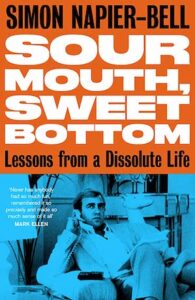The following is an abbreviated chapter from Simon Napier-Bell’s latest book, Sour Mouth Sweet Bottom: Lessons from a Dissolute Life , available on Amazon along with his other books, Black Vinyl White Powder: The Real Story of the British Music Industry, Ta-ra-ra-boom-de-ay, The Business: A History of Popular Music from Sheet Music to Streaming and I’m Coming to Take You to Lunch
Fifteen years ago, I was in Ho Chi Minh City as a consultant to an Australian woman talent-searching Asian artists. We’d done India and China and the Philippines; now it was time for Vietnam and we weren’t sure what we’d find.
Tourism wasn’t yet flourishing as it is today and cultural matters were tightly controlled; there were still no discos for young people though record stores had a smattering of rock records by Western groups. The government thought dance music might encourage unwanted teenage pregnancies. They didn’t worry much about rock; it encouraged young people to learn musical instruments, which was considered a good thing.

Colleen, the Australian woman who was leading the talent search, had contacted the Ministry of Education who had given their approval for us to do auditions in a school in Ho Chi Minh City. It was very low-key; they’d simply put up one small poster in front of the school gates announcing it. We didn’t expect more than thirty kids to turn up but when we arrived at the school at 9 a.m. we were told there were more than two hundred, and the teacher organising things was adamant: everyone who had asked to audition must be given the chance to do so. We only had one day: at five minutes per song and twelve songs an hour, two hundred would be impossible. So we agreed with her we could stop anyone we thought was no good once they’d sung for a minute.
There were microphones but no mixing desk. The kids auditioning could sing a cappella or bring an instrument onto the stage with them, but no backing tapes were allowed. We were trying to keep it simple.
At 9:30 a.m., fortified with mugs of green tea, we started – four of us − me, Colleen, her assistant Marie, and my pal Simon Henderson, a record producer based in Bangkok. The singers weren’t good. The girls were introverted and shy; the boys, extroverted and tuneless. It was hard going.
At the back of the room were three government officials. ‘From the ministry,’ the organising teacher told us, though from which ministry she failed to say. Of education? Of culture? Of censorship? Whichever it was, they weren’t a happy trio. They looked threatening and sour. On the other hand, although they were videoing everything, they said nothing and let us get on with it.
After an hour we were doing well. With our one-minute dismissal option, we’d already got through twenty-five. A small, sweet girl, probably no more than twelve, came onto the stage and said she was going to sing ‘I Will Survive’. There was no song we were more bored with, except perhaps Whitney Houston’s ‘I Will Always Love You’. The week before in Manila 90 per cent of all the girls we auditioned chose one or the other of those two songs. But at least Filipino girls knew how to belt out a tune. These Vietnamese girls didn’t.
The shy girl sang how she looked – no projection, no stage presence, no confidence – and she took the song at a snail’s pace, singing the English lyrics with no indication she understood their meaning. We waited for our stopwatch to hit the minute mark so we could wave her off the stage but just as it was getting there she arrived at the second verse. And she came up with a wonderful new line… ‘I should have changed the fucking lock.’
It completely floored us. Where could she have got that from? Had her music teacher OK’d it? Did the men from the ministry know what it meant? Did twelve-year-old girls in Vietnamese schools normally speak like that? It was so cheering that we let her go right to the end of the song. It perked up us up no end. Especially when, ten minutes later, another girl sang exactly the same line; then later, yet another.
At lunchtime I checked on YouTube. Yes, there it was, a version of the song by an American indie group called Cake. And although these girls had probably learned the tune from bootleg cassettes of Gloria Gaynor, when they’d gone looking for the lyrics they’d found Cake. Quite delicious!
After lunch there was a rock group. We hadn’t anticipated one but since we’d said singers could bring their own instruments, we couldn’t refuse. Having wasted fifteen minutes setting up, they announced they were going to play us some death metal, then launched into the heaviest of heavy sado-gothic rock. There were bone-crushing power chords and satanic feedback.
In the West any group playing this sort of music was saying one thing only: ‘Fuck life. Fuck the government. Fuck the world. Fuck me. Fuck everything.’ But when I turned round to look at the men from the ministry they seemed to be enjoying it, nodding along, paying attention to the Vietnamese words and even singing along, though by the sound of the music I could only presume the group were singing something like, ‘Shit on all humanity and eat the corpses.’
After they’d finished, I talked with the lead singer, a university student who spoke good English. ‘I’m amazed the Ministry of Culture approve of your music,’ I told him. Don’t they object even a little bit?’
‘Oh no,’ he said. ‘They like it.’
There was obviously something about it I hadn’t understood.
‘What are the lyrics?’ I asked.
He carefully wrote them out on a piece of paper and handed it to me. ‘We love our government. They are good to us. They give us schools to study at and books to read, they build roads for us to walk along and they plant beautiful trees. Life is good when the government loves the people.’
He was an intelligent young guy so I asked him, ‘Doesn’t this beg a question of artistic ethics? Surely your genre of rock is negated by the use of words that are unsuited to it? Can you really call it death metal when you’ve cynically written lyrics praising the government simply to get permission to play? Or is it satire?’
‘It’s not satire,’ he said, ‘and it’s not cynical. The music represents Vietnam’s suffering in the past while the lyrics are its hopes for the future.’
‘What subjects are you taking at university?’ I asked.
‘Logic and Political Science,’ he told me.
This seemed to be a conversation worth having. But before we could get properly started on it we were interrupted by the next act, another young girl. Probably about to tell us she should have changed the fucking lock.



